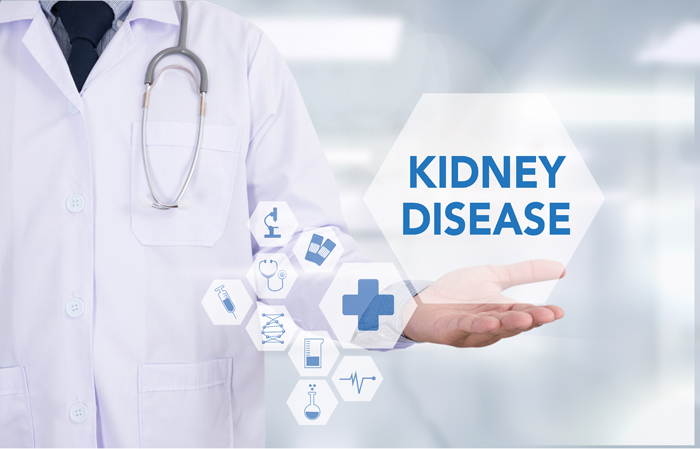Kidney disease and nephrology
Kidney illness can impair your body's capacity to cleanse your blood, filter excess water from it, and regulate your blood pressure. It can also have an impact on red blood cell synthesis and vitamin D metabolism, both of which are important for bone health. Waste products and fluid might build up in your body if your kidneys are damaged. Swelling in the ankles, nausea, weakness, poor sleep, and shortness of breath are all possible side effects. The damage might worsen without therapy, and your kidneys may eventually stop working.

What is Nephrology?
Nephrology is a specialisation of internal medicine that deals with kidneys. Diagnosis, treatment, and maintenance of kidney functions, as well as renal (kidney) replacement therapy, such as dialysis and kidney transplantation, are all included.
Nephrologists are specialist doctors that deal with kidney-related systemic diseases such as diabetes and autoimmune illness, as well as hypertension (high blood pressure) and electrolyte imbalances.
What are the types of kidney diseases?
- Acute and chronic kidney diseases
- Fluid and electrolyte disorders
- Glomerulonephritis and glomerular diseases
- Lupus
- Hypertension
- Kidney-related metabolic disorders
- Kidney stones
- Rare and genetic kidney diseases
What are the symptoms of kidney disease?
- High blood pressure
- Fatigue
- Weakness
- Sleeping issues
- Chest pain
- Shortness of breath
- Nausea and vomiting
- Loss of appetite
- Muscle cramps
- Swelling in your feet and ankles
What are the causes of kidney disease?
- Acute kidney damage
Also known as acute renal failure, occurs when your kidneys suddenly stop working. The following are the primary causes:- There is an insufficient blood supply to the kidneys.
- Kidney injury is caused by a direct hit to the kidneys.
- Kidneys were clogged with urine.
- Chronic kidney disease
Chronic disorders occur when your kidneys do not function properly for more than three months. It's possible that you won't notice any symptoms in the early stages, but that's when it's easiest to treat. The most prevalent causes are diabetes (types 1 and 2) and excessive blood pressure. Over time, high blood sugar levels might injure your kidneys. Furthermore, high blood pressure damages your blood arteries, especially those that supply your kidneys.
When to go to the doctor?
If you suffer any of the symptoms mentioned above you should immediately contact your doctor.
Request an appointment at Apollo Spectra Hospitals
Call 1860-500-2244 to book an appointment
What are the risk factors for kidney disease?
Diabetics are at an increased risk of getting a renal disease. Diabetes is the most common cause of kidney disease, accounting for over 44% of new cases. You may also be at a higher risk of developing kidney disease if you:
- Diabetes
- High blood pressure
- Heart diseases such as coronary artery disease, or congestive heart failure
- Other vascular diseases such as cerebrovascular disease (strokes) and peripheral vascular disease (such as aortic aneurysms)
- A family history of kidney disease
- Prolonged use of non-steroidal anti-inflammatory drugs (NSAIDs) such as Advil (ibuprofen) and Celebrex
How is kidney disease treated?
- Medication
- angiotensin-converting enzymes (ACE) inhibitors, such as lisinopril and ramipril
- angiotensin receptor blockers (ARBs), such as irbesartan and olmesartan
- cholesterol drugs such as simvastatin
- Make lifestyle changes
- Use insulin injections to manage diabetes
- Limit high-cholesterol meals 3. limit salt 4. begin a heart-healthy diet rich in fresh fruits, vegetables, whole grains, and low-fat dairy products
- Consume alcohol in moderation
- Increase physical activity after quitting smoking
- Shed some pounds
- Hemodialysis
- Peritoneal dialysis
Conclusion
The kidneys may be unable to eliminate waste as a result of this injury. Genetic issues, trauma, and medications can all be factors. If you have diabetes, high blood pressure, or a close relative with kidney disease, you're more likely to get a renal disease. Chronic renal disease wreaks havoc on the nephrons over time. Cancer, cysts, stones, and infections are some of the other issues that can affect the kidneys. You'll require dialysis or a kidney transplant if your kidneys fail.
- Drink a lot of water.
- If you have diabetes, keep your blood sugar under control.
- Keep your blood pressure under control.
- Limit your salt intake.
- Quit smoking.
- Glomerular filtration rate (GFR)
- Ultrasound or computed tomography (CT) Scan
- Kidney biopsy
- Urine test
- Blood creatinine test
A kidney transplant is a replacement procedure of your damaged kidney with a healthy one from a donor by a surgeon in case of kidney failure. The donor of the kidney could be dead or living. You must take medicine for the rest of your life to ensure that your body does not reject your new kidney after the treatment.
Our Top Specialities
NOTICE BOARD
CONTACT US
CONTACT US
 Book Appointment
Book Appointment


.svg)
.svg)
.svg)
.svg)








